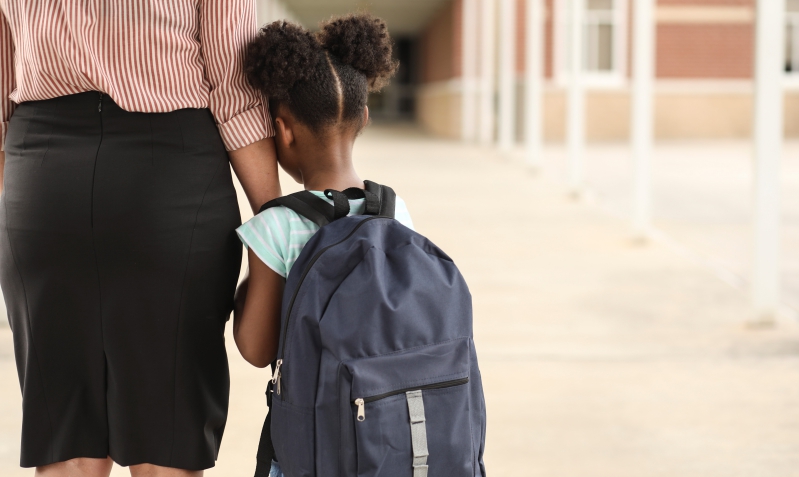
Scholars advocate revising mandated reporting requirements for school employees.
Before turning 18 years old, 53 percent of Black children in the United States will experience a child protective services (CPS) investigation in their home. As a branch of state agencies, CPS holds the authority to remove children from their families, making these investigations coercive and often traumatic. Further, the overwhelming majority of such investigations do not find instances of child abuse or neglect.
School employees make more reports to CPS than anyone else under mandated reporting requirements. Moreover, they disproportionately refer Black families, and the resulting investigations are more likely to traumatize children than protect them, argue Brianna Harvey, Josh Gupta-Kagan, and Christopher Church in a law journal article.
“At every stage of the process, allegations from schools are less likely to protect children,” Harvey, Gupta-Kagan, and Church argue.
They advocate the eradication of mandated reporting requirements for schools. Instead, the law should simply allow school staff to refer families directly to social and legal services. The authors emphasize that although children who experience hardships that trigger mandated reporting do typically need help, in most cases CPS does not support the children’s needs effectively.
Mandated reporting derives from state statutes—present in every state –that require school employees to report any suspicion of child abuse and neglect. Under the federal Child Abuse Prevention and Treatment Act (CAPTA), all states are required to have a mandated reporting law in order to receive federal funding for child abuse and neglect prevention and response.
Harvey, Gupta-Kagan, and Church explain that many states passed mandated reporting laws in reaction to an article written by pediatrician Henry Kempe, who argued that medical professionals should be trained to identify severe physical abuse in children. Over time, the breadth of mandated reporting statutes expanded to include many other professionals, such as school employees, and to encompass suspicions of vastly more expansive definitions of neglect.
This expansion of mandatory reporting does not necessarily help children, argue Harvey, Gupta-Kagan, and Church. Under the current system, CPS referrals do not guarantee families are referred to services. In 2018, 39 percent of children who were found to be victims by CPS were not provided with any services after CPS investigations concluded.
To address this problem, the authors propose that school employees should be given an option to refer families directly to services—such as legal aid that can provide them assistance in accessing food, housing, protection orders—and other supports, such as mental health services and substance abuse treatment.
Harvey, Gupta-Kagan, and Church advocate the revision of legal reporting requirements because the underlying problems in the vast majority of incidents that school employees are now legally required to report run far deeper than the focus of CPS investigations. CPS investigators are legally required to look for parental fault to substantiate an allegation, not to understand the web of factors leading to the child’s situation.
For example, if CPS investigators are called to investigate a family’s alleged unsuitable housing conditions, CPS looks for parental fault for the living conditions. The investigation searches for parental fault because intentional acts of abuse or neglect are required for CPS to intervene.
But such investigations miss the reality that many low-income communities and families of color are segregated into housing, facing a power imbalance and lack of autonomy over their living situations. Low-income families of color often live in housing controlled by landlords or government entities, and they have limited or no ability to enforce their rights as tenants. What families often may need, in reality, are legal services to help them gain access to safe housing.
Changing the mandated reporting requirements would not ignore children who are struggling, Harvey, Gupta-Kagan, and Church explain. Their proposed shift would instead better align the role of schools, the needs of children, and the availability of public resources to support families. Under their proposal, severe cases of abuse and neglect would still be reported when state intervention is needed to protect children.
Today, proposed revisions to CAPTA may reduce unnecessary CPS involvement and racial bias in the family regulation system. U.S. Senators Patty Murray (D-Wash.) and Richard Burr (R-N.C.) introduced the CAPTA Reauthorization Act of 2021 earlier this year. The bill has since been sent to the U.S. Senate Committee on Health, Education, Labor, and Pensions. The bill includes provisions that would address racial disparities and bias in the CPS system and would encourage states to identify alternative pathways to connect families facing hardship with resources.
Similarly, Harvey, Gupta-Kagan, and Church reimagine the role of schools in statutory child protection schemes. They conclude that although current mandating requirements represent a “missed opportunity,” regulatory changes could empower school staff to connect families directly with “more effective and less coercive” aid.



